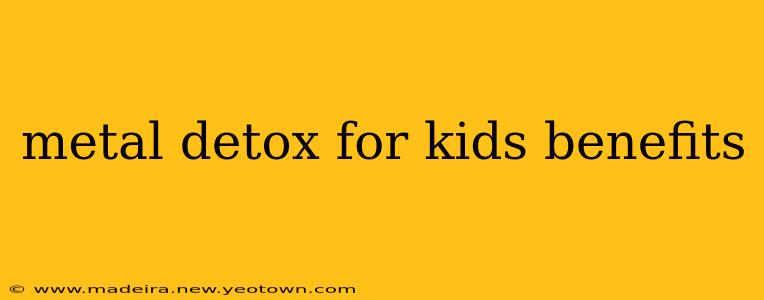Many parents are increasingly concerned about the potential impact of heavy metals on their children's health. While heavy metal exposure is a serious issue, it's crucial to understand the nuances of "metal detox" for kids and approach the topic with informed caution. This isn't about a quick fix or a magic bullet, but rather a holistic approach to supporting a child's body in its natural detoxification processes.
My name is Dr. Emily Carter, and I've dedicated my career to pediatric environmental health. This isn't medical advice; always consult with your pediatrician before making any significant changes to your child's health routine.
What are Heavy Metals and How Do Kids Get Exposed?
Heavy metals like lead, mercury, cadmium, and arsenic are naturally occurring elements, but human activities have increased their presence in the environment. Children are particularly vulnerable because their bodies are still developing and their systems are less efficient at eliminating toxins. Exposure can happen through various pathways:
- Food: Contaminated fish, fruits, and vegetables.
- Water: Lead pipes in older homes, industrial pollution.
- Air: Vehicle emissions, industrial fumes.
- Consumer Products: Certain toys, paints, and cosmetics.
- Vaccines: A significant concern for some parents, but it's important to note that the trace amounts of heavy metals in vaccines are far below levels considered harmful, and the benefits of vaccination far outweigh the theoretical risks.
Does My Child Need a "Metal Detox"?
This is a crucial question. Most children don't need a specific "metal detox" program. A healthy diet, regular exercise, and a safe living environment are typically sufficient to support their body's natural detoxification processes. However, if your child has elevated levels of heavy metals (determined through testing by a healthcare professional), a tailored approach might be necessary, guided by a medical doctor.
What are the signs of heavy metal toxicity in children?
This is a common parental concern. Symptoms can be subtle and mimic other conditions, making diagnosis challenging. Some potential signs include developmental delays, behavioral problems, learning difficulties, fatigue, digestive issues, and immune dysfunction. It is crucial to note that these symptoms can be caused by a variety of factors, and heavy metal toxicity should not be assumed without proper testing.
How are heavy metal levels tested in children?
Testing usually involves blood or urine samples. However, the accuracy and interpretation of results can be complex, so consultation with a healthcare professional experienced in environmental toxicology is essential. A doctor can help determine if testing is necessary and how to interpret the results.
What are the benefits of supporting a child’s natural detoxification processes?
Supporting your child's natural detoxification pathways focuses on creating an optimal environment for their body to function optimally. This includes:
- Nutrition: A diet rich in fruits, vegetables, and whole grains provides essential nutrients that support liver function and detoxification.
- Hydration: Plenty of water helps flush toxins from the body.
- Exercise: Physical activity enhances circulation and supports the elimination of toxins.
- Sleep: Adequate sleep is crucial for cellular repair and detoxification.
- Stress Reduction: Chronic stress can impair detoxification processes.
What about chelation therapy for children?
Chelation therapy is a medical procedure used to remove heavy metals from the body. It should only be undertaken under the strict supervision of a qualified medical doctor experienced in this area, and it's not a recommended approach unless absolutely necessary after confirmed high heavy metal levels through rigorous testing. Chelation therapy can have potential side effects, and the risks must be carefully weighed against the benefits.
Conclusion: A Holistic Approach
Instead of focusing on a specific "metal detox," concentrate on building a strong foundation for your child's health. This includes providing a healthy diet, clean water, minimizing exposure to environmental toxins, and ensuring adequate sleep and physical activity. Regular check-ups with your pediatrician are vital to monitor your child's growth and development. If you have concerns about heavy metal exposure, discuss them openly with your child's doctor to determine the appropriate course of action. Remember, prevention is always better than cure.

